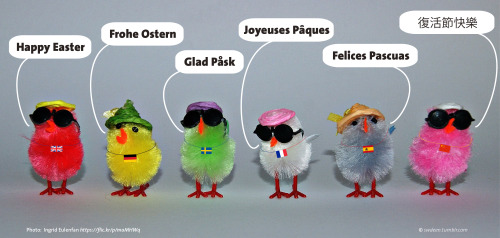#chinesisch
Quando você começa a estudar um novo idioma e vai logo procurando aprender palavras importantes…
Post link
»Easter« has its roots in the Latin »Pascha« and Hebrew »Pesah« and is the celebration period of the resurrection of Jesus.
While the Swedish, French and Spanish word for Easter are clearly referring to the origin in the Latin and Hebrew root, the German and English words trace back to a different origin.
There are several theories that can be found and—as so often—no one can tell which theory is the right one.
- It could derive from the old Germanic word »Austro« which stands for a »red dawn/aurora«. This bright red light has a symbolic meaning because the empty grave of Jesus has been found and in this theory »Easter« is a symbol of the resurrection.
- Another theory is that »Easter« describes the direction »East« (Germ.: Ost), where the dawn takes place. Many Christians were baptized during dawn on Easter morning. This ceremony was called »Ostaurn«.
- A common but probably false explanation is that the »Ostern« and »Easter« celebration replaced a pagan spring tradition in honor of the Anglo-Saxon goddess Ostara.
Here you can learn the pronunciation of the examples in the pic:
Happy Easter (English),Frohe Ostern (German),Glad Påsk (Swedish),Joyeuses Pâques (French),Felices Pascuas (Spanish)
The Local has collected nine traditions how the Germans celebrate Easter.
Ref.: http://pagewizz.com/frohe-ostern-in-allen-sprachen/
Photo: Ingrid Eulenfan https://flic.kr/p/maMHWq
Post link


